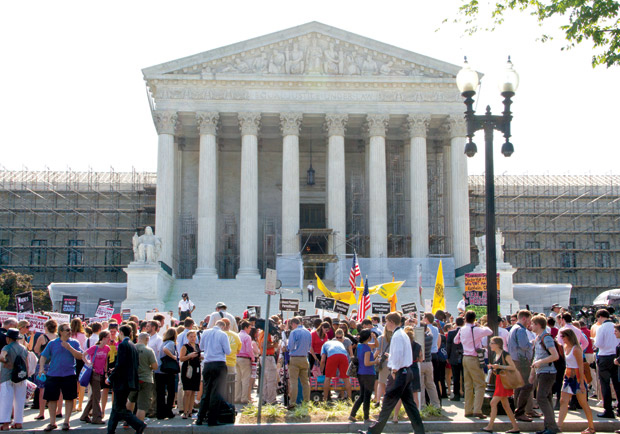The U.S. Supreme Court's ruling upholding the Affordable Care Act—or "Obamacare," as some have dubbed it—has advocates of faith-based nonprofits concerned about potential unintended "collateral damage" to their bottom lines.
The worry: Chief Justice John Roberts's nod to lawmakers' wide discretion to impose taxes—and to condition taxes to influence behavior—could pose threats both to charities' tax exemptions and to donors' tax deductions.
"It's an issue that's definitely on our radar," said Rhett Butler, government liaison for the Association of Gospel Rescue Missions.
W. Scott Brown, vice president of the Christian Leadership Alliance, echoed Butler: "We are following this issue closely."
Stanley Carlson-Thies, president of the Institutional Religious Freedom Alliance, said he'd be surprised if the health-care decision doesn't spark "new activism" on the tax front.
"There's no reason to say the sky is falling before it's falling," he said. "But if it's getting darker, we ought to pay attention."
In a recent piece for The Chronicle of Philanthropy
In the decision, Roberts wrote that "taxes that seek to influence conduct are nothing new."
Some advocates fear that the ruling could embolden efforts to limit exemptions to only nonprofits that serve the poor and minorities, or to only those that provide services the government cannot.
Any reduction in deductions for charitable contributions would "negatively impact churches and many other exempt organizations that depend on such contributions to carry out their respective missions," said Dan Busby, president of the Evangelical Council for Financial Accountability.
Two forces contribute heavily to these concerns, advocates said:
• Lawmakers at all levels of government are seeking ways to increase revenues and balance budgets amid trying economic conditions. In May, New Hampshire's Supreme Court ruled that cities can tax churches on portions of their property deemed not to be used for religious purposes.
"On both sides of the [political] aisle, everything is on the table," said Butler.
• Certain activists are eager to place more conditions and rules on tax-exempt groups—efforts aimed variously at limiting what counts as charitable activity or fighting mission statements and hiring practices deemed discriminatory.
Given how readily many activists label as discrimination "many of the religiously rooted practices of faith-based organizations," Carlson-Thies said, the Supreme Court's ruling could be seen as a "flashing danger signal."
For rescue missions across the nation, recent years already have brought budget crunches, Butler said. The missions, most of which rely on private giving for half to three-quarters of their income, have trimmed overhead and operating costs.
"Any drops in private giving from donors would go straight to frontline services for the hungry and homeless, the abused and addicted," he said.
But he's preparing for a fight. "I think the Supreme Court decision could embolden some people who want to take control of the money that goes to charities," Butler said. "I think that's a very serious problem."
Correction: The print version of this article incorrectly named the state whose Supreme Court recently ruled on church property. It was New Hampshire, not New Jersey.










